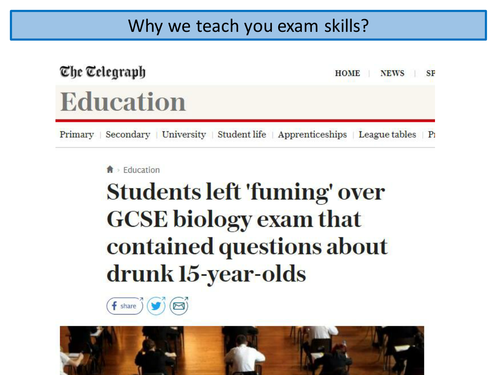









These 7 lessons are designed to teach students key skills they will need to complete science GCSE exams. Lesson should apply to any exam board (AQA, Edexcel, OCR, etc). All examples (apart from a very small amount) are real exam questions or use real exam tables and graphs from old spec (A*-G) and new spec (9-1).
Slides with blue headings are for information and students to take notes if you wish. Slides with orange headers are questions and activities for students to complete.
Not all lessons will last a full hour and others may be slightly too long. You know your classes best so use your judgement.
Lessons DO NOT need to be taught in order, but it would help to do lesson 1 first.
Lesson 1 - Variables
This lesson teaches students independent, dependent and control variables and more importantly how to identify them from tables, graphs and text in exams.
It also covers continuous and categoric variables and which types of graph should be plotted.
Lesson 2 - Conclusions
This lesson teaches students to write conclusions from graphs and tables of data, what it means if data is directly proportional and the difference between describe and explain questions
Lesson 3 – Comparing and Evaluating
This lessons teaches students what to do if they come across the command words compare or evaluate and not just to restate the information in the question
Lesson 4 – Graphs
This lesson focuses on how to plot graphs, how accurate students must be, drawing lines of best fit and dealing with anomalies.
Lesson 5 – Means, Significant Figures and Standard Form
This lesson reminds students of the need for certain mathematical skills in all science (not just physics equations). It covers how to calculate means and check you’re right, taking anomalies into account and how to use standard form and significant figures.
Lesson 6 – Writing Methods
This lesson teaches students how much detail is needed if they are asked to write a method and the need to describe the use of the apparatus.
Lesson 7 – Keywords
This lesson teaches students about common misuse of scientific keywords. For example, when they say something would be more accurate when they mean precise.
Slides with blue headings are for information and students to take notes if you wish. Slides with orange headers are questions and activities for students to complete.
Not all lessons will last a full hour and others may be slightly too long. You know your classes best so use your judgement.
Lessons DO NOT need to be taught in order, but it would help to do lesson 1 first.
Lesson 1 - Variables
This lesson teaches students independent, dependent and control variables and more importantly how to identify them from tables, graphs and text in exams.
It also covers continuous and categoric variables and which types of graph should be plotted.
Lesson 2 - Conclusions
This lesson teaches students to write conclusions from graphs and tables of data, what it means if data is directly proportional and the difference between describe and explain questions
Lesson 3 – Comparing and Evaluating
This lessons teaches students what to do if they come across the command words compare or evaluate and not just to restate the information in the question
Lesson 4 – Graphs
This lesson focuses on how to plot graphs, how accurate students must be, drawing lines of best fit and dealing with anomalies.
Lesson 5 – Means, Significant Figures and Standard Form
This lesson reminds students of the need for certain mathematical skills in all science (not just physics equations). It covers how to calculate means and check you’re right, taking anomalies into account and how to use standard form and significant figures.
Lesson 6 – Writing Methods
This lesson teaches students how much detail is needed if they are asked to write a method and the need to describe the use of the apparatus.
Lesson 7 – Keywords
This lesson teaches students about common misuse of scientific keywords. For example, when they say something would be more accurate when they mean precise.
Something went wrong, please try again later.
These are great, thank you for the time and effort to collate them
Thank you :)
Excellent resource, thank you so much
really useful, thank you
Wow thank you - you hav just saved me hours and hours of work!!!"
Report this resourceto let us know if it violates our terms and conditions.
Our customer service team will review your report and will be in touch.
£0.00